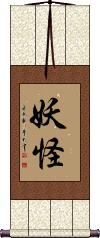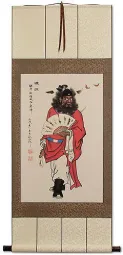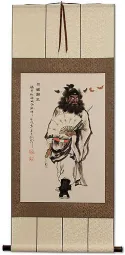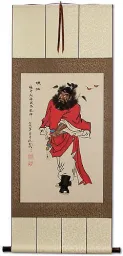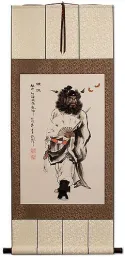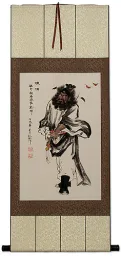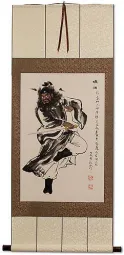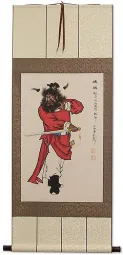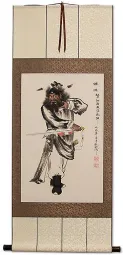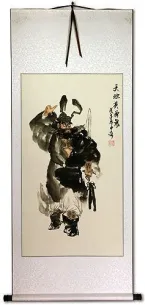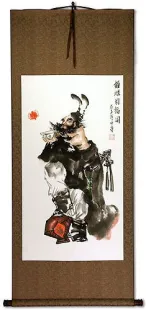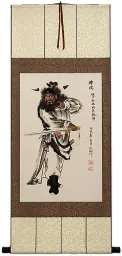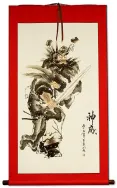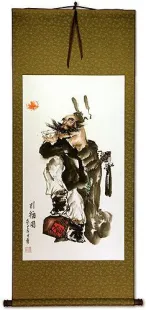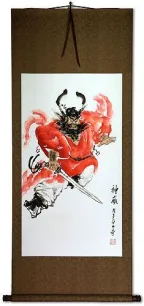Many custom options...
And formats...

Ghost Apparition Phantom in Chinese / Japanese...
Buy a Ghost Apparition Phantom calligraphy wall scroll here!
Ghost / Apparition / Phantom
妖怪 is a Chinese, Japanese Kanji, and old Korean Hanja word that can be defined as a devil, ghost, apparition, phantom, specter/spectre, demon, monster, or goblin.
This in-stock artwork might be what you are looking for, and ships right away...
Zhong Kui Ghost Warrior Of China Wall Scroll
Discounted Blemished
Gallery Price: $53.00
Your Price: $29.00
Zhong Kui Ghost Warrior
Large Wall Scroll
Discounted Blemished
Gallery Price: $65.00
Your Price: $36.00
Gallery Price: $108.00
Your Price: $59.88
Zhong Kui Chinese Ghost Warrior
Wall Scroll
Discounted Blemished
Gallery Price: $90.00
Your Price: $39.00
Chinese Mountain Cliff Village Landscape Painting
Discounted Blemished
Gallery Price: $38.00
Your Price: $21.00
Not the results for Ghost Apparition Phantom that you were looking for?
Below are some entries from our dictionary that may match your Ghost Apparition Phantom search...
| Characters If shown, 2nd row is Simp. Chinese |
Pronunciation Romanization |
Simple Dictionary Definition |
妖怪 see styles |
yāo guài yao1 guai4 yao kuai youkai / yokai ようかい |
More info & calligraphy: Ghost / Apparition / Phantomghost; apparition; phantom; spectre; specter; demon; monster; goblin; yōkai |
妖魔 see styles |
yāo mó yao1 mo2 yao mo youma / yoma ようま |
More info & calligraphy: Demon / Ghost / Apparitionghost; monster; demon; phantom; apparition |
化物 see styles |
huà wù hua4 wu4 hua wu kemotsu ばけもん |
goblin; apparition; monster; ghost; phantom; spectre; specter to convert beings |
妖鬼 see styles |
youki / yoki ようき |
ghost; apparition; phantom; spectre; specter; demon; monster; goblin |
幽霊 see styles |
yuurei / yure ゆうれい |
ghost; specter; spectre; apparition; phantom |
怪異 怪异 see styles |
guài yì guai4 yi4 kuai i kaii / kai かいい |
monstrous; strange; strange phenomenon (noun or adjectival noun) (1) mystery; curiosity; strangeness; monstrosity; (2) ghost; monster; apparition; phantom; spectre; specter; goblin |
曲物 see styles |
wagemono わげもの magemono まげもの kusemono くせもの |
circular box; (1) circular box; (2) article for pawning; (1) ruffian; villain; knave; thief; suspicious fellow; (2) peculiar person; idiosyncratic person; stubborn fellow; (3) tricky thing; something that is more than it seems; (4) expert; master; highly skilled person; (5) goblin; apparition; monster; ghost; phantom; spectre; specter |
曲者 see styles |
kusemono くせもの |
(1) ruffian; villain; knave; thief; suspicious fellow; (2) peculiar person; idiosyncratic person; stubborn fellow; (3) tricky thing; something that is more than it seems; (4) expert; master; highly skilled person; (5) goblin; apparition; monster; ghost; phantom; spectre; specter |
癖者 see styles |
kusemono くせもの |
(1) ruffian; villain; knave; thief; suspicious fellow; (2) peculiar person; idiosyncratic person; stubborn fellow; (3) tricky thing; something that is more than it seems; (4) expert; master; highly skilled person; (5) goblin; apparition; monster; ghost; phantom; spectre; specter |
くせ者 see styles |
kusemono くせもの |
(1) ruffian; villain; knave; thief; suspicious fellow; (2) peculiar person; idiosyncratic person; stubborn fellow; (3) tricky thing; something that is more than it seems; (4) expert; master; highly skilled person; (5) goblin; apparition; monster; ghost; phantom; spectre; specter |
化け物 see styles |
bakemono ばけもん |
(ik) goblin; apparition; monster; ghost; phantom; spectre; specter; goblin; apparition; monster; ghost; phantom; spectre; specter |
バケモン see styles |
bakemon バケモン |
goblin; apparition; monster; ghost; phantom; spectre; specter |
Variations: |
bakemono(p); bakemon; bakemono; bakemon ばけもの(P); ばけもん; バケモノ; バケモン |
goblin; apparition; monster; ghost; phantom; spectre; specter |
Variations: |
kusemono くせもの |
(1) ruffian; villain; knave; thief; suspicious fellow; (2) peculiar person; idiosyncratic person; stubborn fellow; (3) tricky thing; something that is more than it seems; (4) expert; master; highly skilled person; (5) goblin; apparition; monster; ghost; phantom; spectre; specter |
Variations: |
bakemono(p); bakemon; bakemono(sk) ばけもの(P); ばけもん; バケモノ(sk) |
goblin; apparition; monster; ghost; phantom; spectre; specter |
Variations: |
kusemono くせもの |
(1) ruffian; villain; knave; thief; suspicious fellow; (2) peculiar person; idiosyncratic person; stubborn fellow; (3) tricky thing; something that is more than it seems; (4) expert; master; highly skilled person; (5) goblin; apparition; monster; ghost; phantom; spectre; specter |
Variations: |
kusemono; kusemono くせもの; クセモノ |
(1) ruffian; villain; knave; thief; suspicious fellow; (2) peculiar person; idiosyncratic person; stubborn fellow; (3) tricky thing; something that is more than it seems; (4) expert; master; highly skilled person; (5) goblin; apparition; monster; ghost; phantom; spectre; specter |
The following table may be helpful for those studying Chinese or Japanese...
| Title | Characters | Romaji (Romanized Japanese) | Various forms of Romanized Chinese | |
| Ghost Apparition Phantom | 妖怪 | you kai / youkai / yo kai | yāo guài / yao1 guai4 / yao guai / yaoguai | yao kuai / yaokuai |
Successful Chinese Character and Japanese Kanji calligraphy searches within the last few hours...
